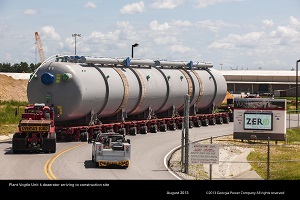Fighting for the Next Inch
I had an interesting conversation with some colleagues last night. We were talking about our jobs, and it turned out that some of them were considering moving on to new prospects outside of the nuclear industry. After digging in to the reasons why, the sentiment seemed to come down to "It feels like we're running as hard as we can only to gain inches every day."
There is a constant fight for nuclear's progress in public perception, regulatory oversight, and demands for perfection. The stagnation of progress was what was so frustrating to them.
Here at the Vogtle nuclear power plant in Georgia, where construction of two new reactors is occurring, people are working on systems right now and comprehensively understanding their behaviors under normal plant operations, while the components themselves are only ink on paper. We are testing, retesting, and scrutinizing every last detail of every piece that is going into the nuclear island. We look at diameter, radius, flow rate, material certification, and thickness. We document the construction, the fabrication, any deviations, the corrections, the exchange of our corrections, the meetings that approve the corrections-and if we missed any of those steps, we have another corrective action to document that.
Why this level of seeming absurdity? Well, it is our duty to make sure that we never lose ground, that we document things to this level, that we perform beyond what we think our limit is. It is our duty to always be better. Every document that we sign, every peer or family member that finally comes around, every congressman we persuade, every argument in which we triumph, that is an inch that does not slip.
How do we ensure that? Through our culture. Our nuclear safety culture is the only thing that can breed the trust that we deserve to be a viable energy solution for the future.
Nuclear culture is all about asking questions, and its most underutilized component is corrective actions. I have seen companies pull off their corrective actions brilliantly. It isn't easy but it is possible; you need to staff up and dedicate your company to identify and correct any problems that come up. Improvements need to be funneled and optimized to run projects better. As a person, you can never afford to see corrective actions as a negative, even when you have the weight of an angry manager breathing down your neck.
If someone calls into question the quality of our construction-this is when I laugh. I do so because this is how we run our industry, through scrutiny and questioning attitudes. Because of this, nuclear fosters a different kind of thinking; there are those of us who are in it because it is a prestigious stepping stone, others who are interested in a career-and there are some of us for whom this is a passion. Some of us are vehement in our will to succeed because, to us, there is no other option.
I mean that in a literal sense. There is in my mind no better energy option than having a nuclear fleet, augmented with passive energy collection, that supports an infrastructure of homes and businesses with all the electric power they could need.
I am an idealist; I believe that what I do every day is injecting some good into the world. Everyone deserves to have energy; every person on this planet has the right to survive despite the sweltering heat of summer, or have the ability to turn on a computer that will link them with the rest of the world. There is one thing that every human needs on this planet along with food, water, and shelter, and that is electric power. There are only inches gained, but those inches are precious.
I don't begrudge anyone who wants to leave the nuclear industry-it's a tough call to action, and I can understand how it could wear you out. Every day we come in and stand up to more scrutiny than any other industry in the world. While we complete this Vogtle project, elsewhere four or five natural gas facilities will have been built, more coal plants go up in the world, and more windmills too. In the end, though, nuclear isn't about fast action, it's about longevity.
When natural gas spikes again and the generators go quiet, we'll keep chugging along. When coal gets a carbon cap put on it and stops spewing pollution into the atmosphere that we all share, we'll still be churning through our own fuel. When the windmills stop turning because the wind is blowing the wrong direction, we'll be running through our +97 percent uptime.
And I'll be coming in to work that day, fighting for the next inch.
__________________
 Peter Shaw is a senior licensing engineer at Westinghouse Electric Company for the Vogtle project. He is very involved in North American Young Generation in Nuclear and the American Nuclear Society, and is a member of the ANS Young Members Group and Operations & Power Division.
Peter Shaw is a senior licensing engineer at Westinghouse Electric Company for the Vogtle project. He is very involved in North American Young Generation in Nuclear and the American Nuclear Society, and is a member of the ANS Young Members Group and Operations & Power Division.











